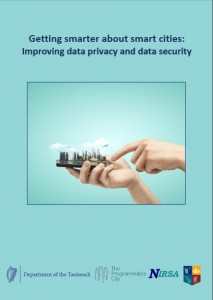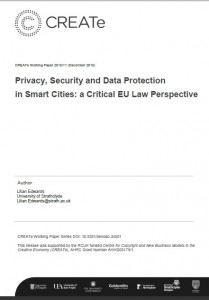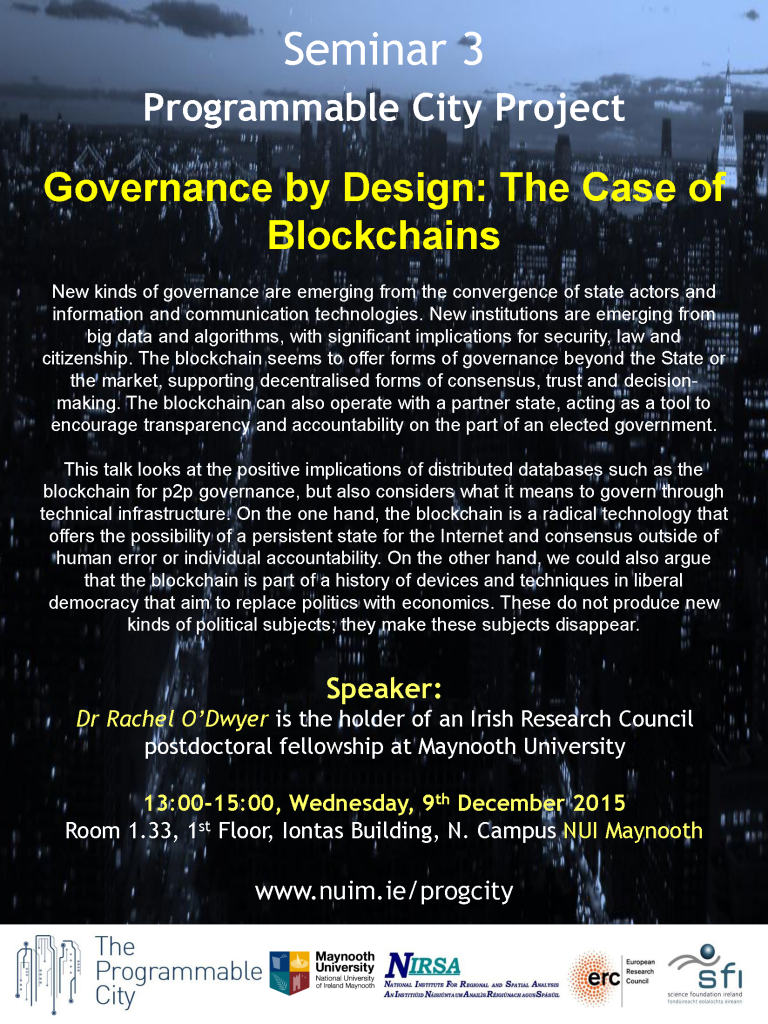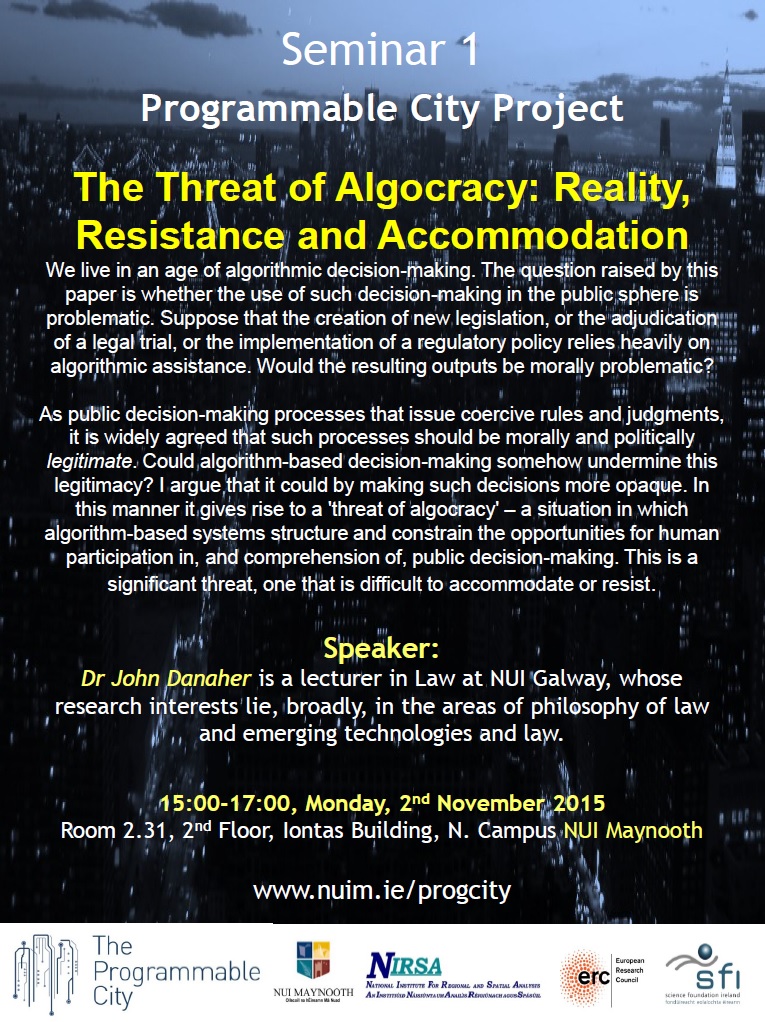Last Thursday saw the launch of the ‘Getting Smarter about Smart Cities: Improving Data Privacy and Data Security‘ report by Rob Kitchin and published by the Department of the Taoiseach. The report was submitted a few days before the publication of a similar report by Lilian Edwards titled ‘Privacy, Security and Data Protection in Smart Cities: a Critical EU Law Perspective‘ and therefore has no reference to it. Whereas my report takes a more governance and policy focused approach, Lilian’s is more legally focused. If taken as a pair I think they provide a pretty comprehensive overview of the various privacy and security issues raised by smart city technologies and possible solutions.
Tag Archives: governance
Seminar – Governance by Design: The Case of Blockchains
We are delighted to have Dr. Rachel O’Dwyer as a guest speaker on Wednesday 9th December at 1pm, Iontas Building, room 1.33 for the third of our Programmable City seminars this semester.
Rachel is the holder of an Irish Research Council post-doctoral fellowship in Maynooth University, where she is preparing a book based on her thesis focused on the political economy and historical development of mobile networks. She is the founding editor-in-chief of the peer-reviewed journal Interference and leader of the Dublin Art and Technology Association. She is curator of the Openhere conference and festival, and member of the peer-to-peer foundation, coordinating the P2P academic research network with Penny Travlou.
Rachel will be talking about the implications of the blockchain for peer-to-peer governance; a blockchain being a form of decentralised digital database mostly associated with the cryptocurrency BitCoin.
Seminar – The Threat of Algocracy: Reality, Resistance and Accommodation
We are delighted to welcome Dr. John Danaher to Maynooth on Monday 2nd November at 3pm, Iontas Building room 2.31 for the first of our Programmable City seminars this semester.
Dr. John Danaher is a lecturer in Law at NUI Galway. His research interests lie, broadly, in the areas of philosophy of law and emerging technologies and law. In the past, he has published articles on human enhancement, brain-based lie detection, the philosophy of punishment and artificial intelligence. He maintains a blog called Philosophical Disquisitions, and he also writes for the Institute for Ethics and Emerging Technologies.
The session will introduce the topic of algorithmic decision-making, exploring the issues related to use of such decision-making in the public sphere is problematic and to how it affects the moral and political legitimacy of the decision-making process.
Data and the City workshop, Session 5 videos
The final set of papers in the Data and the City workshop were a great way to end to a fantastic event. The full catalogue of videos are listed on our Project Videos page and can be found through our Vimeo account. Thanks again for all the attendees for making this year’s workshop such a resounding success.
Data Issues
Smart City, Surveillance City: human flourishing in a data-driven urban world
David Murakami Wood, Associate Professor, Canada Research Chair (Tier II) in Surveillance Studies, Department of Sociology and Cross-Appointed in the Department of Geography, Member of the Surveillance Studies Centre, Queens University, Kingston, Ontario, Canada
Abstract
‘Smart cities’ are characterized by pervasive and distributed sensor networks generating big data for forms of centralized urban management, drawing together such previously unconnected infrastructural systems as video surveillance, meteorological stations, traffic lights and sewage systems. Although presented as largely civic, corporate and managerial, these schemes have a parallel history in military strategic thinking and policing, from crime mapping and predictive policing models, to new forms of urban warfare involving forms of distributed sensor platforms, and computer analytics, to enable forces to get a ‘clear picture’ of the complexities of the urban landscape and its inhabitants. In some cases, these have come together in overt ways, for example in the new ‘Domain Awareness’ initiatives in Oakland, California, and in New York which extends existing port security projects way beyond the military maritime ‘domain’ into the surrounding city and its governance.
Drawing on work in philosophy, science and technology studies, geography and surveillance studies, this paper considers the smart city as the archetypical urban form of the data-driven ubiquitous surveillance society. The paper considers the place of human rights in a broad sense, not simply privacy but also equity, access to services and justice, and ultimately, after Spinoza and Deleuze, the capacity of diverse human beings to flourish, in cities in which people are increasingly monitored, categorized and managed as logistical flows. It suggests some directions from the practices of bottom-up, citizen-centered city hacking initiatives and maker-spaces, but cautions that such practices are already subject to corporate capture and rebranding. The paper concludes that if smart cities are to be a way that big data can serve human flourishing, they need to be detached from narrow techno-economistic purposes and more truly refounded in social-ecological thinking, and this means dismantling many of the surveillance logics that underpin smart cities.
Michel Foucault and the smart city: power dynamics inherent in contemporary governing through code
Francisco Klauser, Assistant Professor, Faculté des lettres et sciences humaines Institut de géographie, Neuchâtel University
Abstract
Drawing upon Michel Foucault’s approach to power and governmentality, the paper explores the regulatory dynamics inherent in contemporary data-driven forms of regulation and management-at-a-distance of urban systems. More specifically, channelled through Michel Foucault’s concept of ‘security’, the paper portrays ‘governing through data’ not only as fundamentally reality-derived, relative and plural in scope and scale, but also as inherently flexible and fluid in aim and functioning. This in turn raises a series of critical questions with regard to the novel possibilities of differentiation and prioritisation, the actual adequateness, and the very implications of contemporary governing through data.
Empirically speaking, the paper focuses on the study of two high-profile pilot projects in Switzerland in the field of smart electricity management: iSMART and Flexlast. Both projects rely on massive efforts of data generation, interconnection and analysis, thus allowing the critical investigation of the rationales and problems inherent in the management of urban systems through data.
Crime Data and Analytics: Accounting for Crime in the City
Teresa Scassa, Canada Research Chair in Information Law, Faculty of Law, University of Ottawa
Abstract
Crime data are a record of incidents of crime. Such data are routinely compiled by police forces and feed into regional and national crime statistics. Crime data are relied upon in various narratives of crime in society. They are made selectively publicly available as open data and are also increasingly used in visualizations such as urban crime maps. Yet the nature of these data makes uncritical reliance upon them problematic. This paper explores the limits of crime data 21 the constraints on open data as crime data, and the deficiencies of visualizations of crime based on this data. It considers some of the practical, legal and institutional challenges of both expanding and improving these data.
New paper: Anticipatory Logics of the Global Smart City Imaginary
Jim White’s paper, ‘Anticipatory Logics of the Global Smart City Imaginary’, is available for download on the Social Science Research Network as Programmable City Working Paper 8.
Abstract
The smart city encompasses a broad range of technological innovations which might be applied to any city for a broad range of reasons. In this article, I make a distinction between local efforts to effect the urban landscape, and a global smart city imaginary which those efforts draw upon and help sustain. While attention has been given to the malleability of the smart city concept at this global scale, there remains little effort to interrogate the way that the future is used to sanction specific solutions. Through a critical engagement with smart city marketing materials, industry documents and consultancy reports, I explore how the future is recruited, rearranged and represented as a rationalisation for technological intervention in the present. This is done across three recurring crises: massive demographic shifts and subsequent resource pressure; global climate change; and the conflicting demands of fiscal austerity and the desire of many cities to attract foreign direct investment and highly-skilled workers. In revealing how crises are pre-empted, precautioned and prepared for, I argue that the smart city imaginary normalises a style and scale of response deemed appropriate under liberal capitalism.
Keywords: smart cities, the urban age, anticipation, risk
New paper: Data-driven, networked urbanism
A new paper, ‘Data-driven, networked urbanism’, has been published by Rob Kitchin as Programmable City Working Paper 14. The paper has been prepared for the Data and the City workshop to be held at Maynooth University Aug 31th-Sept 1st.
Abstract
For as long as data have been generated about cities various kinds of data-informed urbanism have been occurring. In this paper, I argue that a new era is presently unfolding wherein data-informed urbanism is increasingly being complemented and replaced by data-driven, networked urbanism. Cities are becoming ever more instrumented and networked, their systems interlinked and integrated, and vast troves of big urban data are being generated and used to manage and control urban life in real-time. Data-driven, networked urbanism, I contend, is the key mode of production for what have widely been termed smart cities. In this paper I provide a critical overview of data-driven, networked urbanism and smart cities focusing in particular on the relationship between data and the city (rather than network infrastructure or computational or urban issues), and critically examine a number of urban data issues including: the politics of urban data; data ownership, data control, data coverage and access; data security and data integrity; data protection and privacy, dataveillance, and data uses such as social sorting and anticipatory governance; and technical data issues such as data quality, veracity of data models and data analytics, and data integration and interoperability. I conclude that whilst data-driven, networked urbanism purports to produce a commonsensical, pragmatic, neutral, apolitical, evidence-based form of responsive urban governance, it is nonetheless selective, crafted, flawed, normative and politically-inflected. Consequently, whilst data-driven, networked urbanism provides a set of solutions for urban problems, it does so within limitations and in the service of particular interests.
Key words: big data, data analytics, governance, smart cities, urban data, urban informatics, urban science




